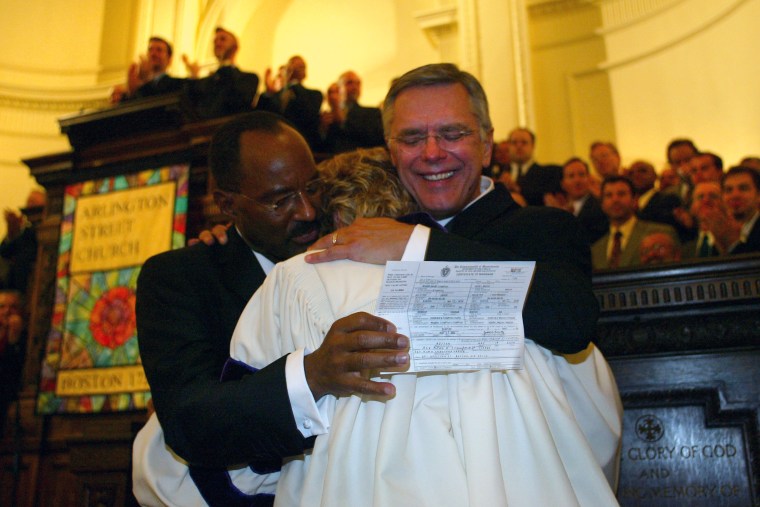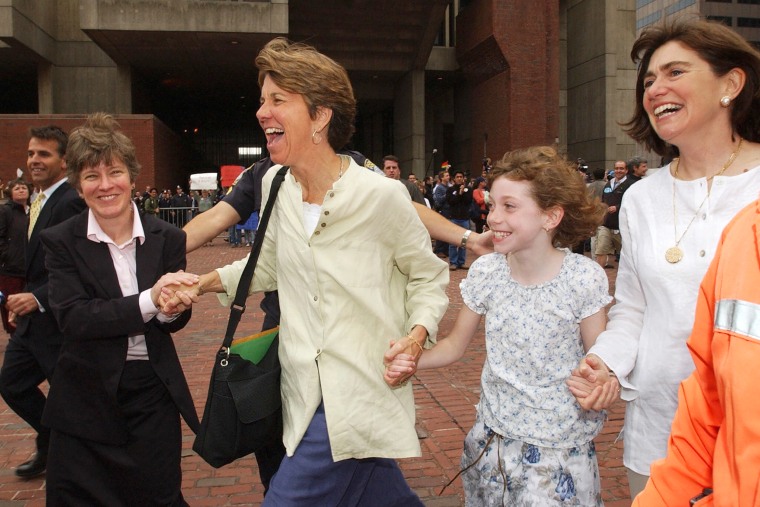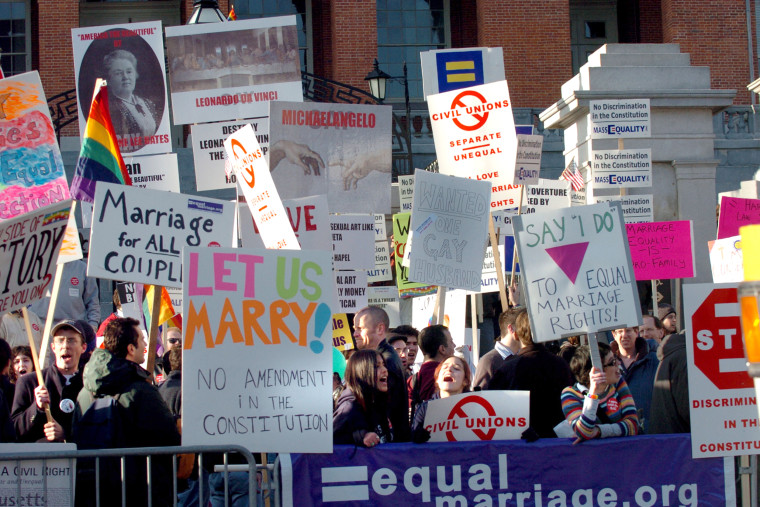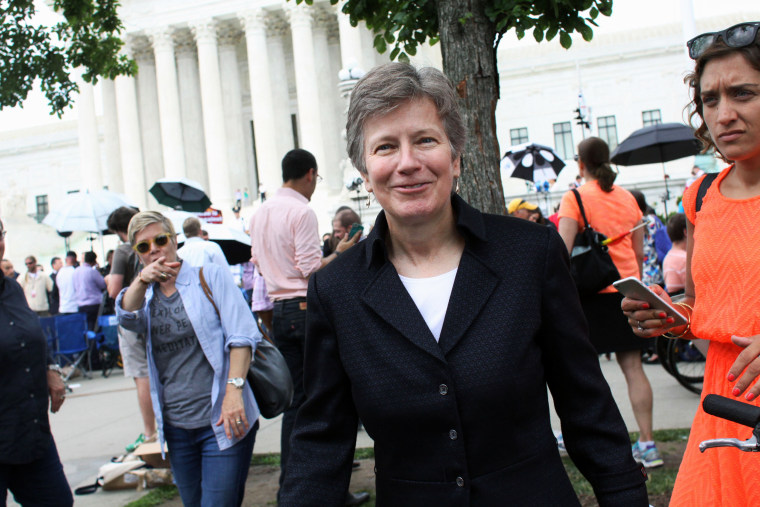20 Yrs Ago Same Sex Marriage in Massachusetts Sparked Gay Marriage Elsewhere
Twenty years ago, on May 17, 2004, Mary Bonauto, the lead attorney in the case that made Massachusetts the first state to grant same-sex couples the right to marry, attended the wedding of two of her clients, Robert Compton and David Wilson.
They were among the first same-sex couples to wed that day, months after the Massachusetts Supreme Judicial Court found that the state constitution granted same-sex couples the right to marry. The November 2003 ruling was followed by a six-month waiting period that brought four lawsuits trying to prevent couples like Compton and Wilson from marrying, but none were successful.
 |
| David Wilson, left, and Robert Compton, embrace the Rev. Kim Crawford Harvie at Arlington Street Church in Boston after she signed their certificate of marrch on May 17, 2004. Pat Greenhouse / Boston Globe via Getty Images file |
Bonauto, who has been an attorney with GLBTQ Legal Advocates and Defenders, or GLAD, since 1990, said she was a “mess” of emotions at her clients’ wedding and started crying before the ceremony even started. But the most powerful moment, she recalled, came when the minister officially married the couple.
“In that packed church that day, when the minister said, ‘By the power vested in me by the Commonwealth of Massachusetts’ — those are words no one had heard before — the place went wild,” Bonauto told NBC News. “I felt chills. I feel chills when I hear that because that is just such a statement of belonging in this culture. It’s not the only one, but boy, it was certainly a statement of non-belonging to be excluded from marriage.”
 |
Chief Justice Margaret H. Marshall wrote in the 4-3 majority opinion that paved the way for Compton and Wilson’s wedding, that marriage is “a vital social institution” that “imposes weighty legal, financial, and social obligations.”
“The question before us is whether consistent with the Massachusetts Constitution, the Commonwealth may deny the protections, benefits, and obligations conferred by civil marriage to two individuals of the same sex who wish to marry,” Marshall wrote. “We conclude that it may not. The Massachusetts Constitution affirms the dignity and equality of all individuals. It forbids the creation of second-class citizens.”
She added that the state failed to identify “constitutionally adequate” reasons for denying same-sex couples the right to marry and that the court wasn’t tasked with answering questions about the morality of same-sex marriage.
“Barred access to the protections, benefits, and obligations of civil marriage, a person who enters into an intimate, exclusive union with another of the same sex is arbitrarily deprived of membership in one of our community’s most rewarding and cherished institutions,” Marshall wrote. “That exclusion is incompatible with the constitutional principles of respect for individual autonomy and equality under law. by Taboo
 |
| Supporters of both viewpoints gathered in front of the steps of the State House in Boston as they waited for a decision on the gay marriage vote on March 29, 2004.Justine Hunt / Boston Globe via Getty Images file |
Bonauto said that, despite some pushback, the decision was met with an overwhelming amount of support. After the 2003 decision, 36 states and Washington, D.C., followed Massachusetts in legalizing same-sex marriage. In June 2015, the Supreme Court ruled remaining state bans on same-sex marriage were unconstitutional.
Bonauto acknowledged other encouraging signs in the fight for LGBTQ rights: In December 2022, dozens of Republicans supported a bipartisan bill to codify protections for same-sex and interracial marriages, and, though recent polls show a slight dip, there’s still broad public support for same-sex marriage across political parties. However, she also noted that there is renewed pushback to LGBTQ rights, particularly the rights of transgender people.
 |
Half of states have enacted measures barring transgender student-athletes from participating on school sports teams that align with their gender identities, and 24 states have restricted transition-related medical care for trans minors, such as puberty blockers, hormone therapy, and surgical procedures. Eleven states have also passed laws that ban trans people from using restrooms consistent with their gender identities in public schools and government-owned buildings.
However, Bonauto said, after having watched the fight for marriage rights, she has hope that the pushback to trans rights will change course.
“It’s easy to be skeptical or unfriendly or hostile when you don’t personally know somebody who’s transgender now, and that was true for gay people and same-sex couples, too,” she said. “And that changed, that sort of discomfort changed, as people got to know same-sex couples, and that gives me hope that this will change with trans people over time, as well.”
Comments